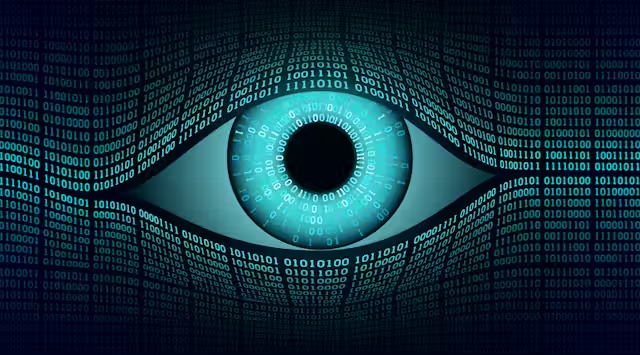Human Lives Human Rights: This is the story of how digital surveillance challenges our humanity, and why it calls for a renewed commitment to human rights.
In a world where we do more and more online, having privacy is as key as having the right to talk, to love, and to dream. Now, with quick tech changes and the wide spread of digital nets, a new fight for our rights has come up—one where our data, our digital footprints, and even what we say online are under constant scrutiny. This is the story of how digital surveillance challenges our humanity, and why it calls for a renewed commitment to human rights.
Think about waking up one day to see that every search you made, every picture you put out, and every talk you had online has been quietly kept by unseen people. For many, this isn’t just a dark dream but a stark reality. In the name of safety, speed, or even more money, governments and big groups are gathering huge amounts of personal info. Some say this helps keep us safe from harm, but the real cost is high. The loss of privacy isn’t just a small error—it hits our pride and our right to think, talk, and live without the fear of always being watched.
For years, the notion of digital surveillance conjured images of dark rooms and harsh rule. Now, watching is part of daily life. Our phones, computers, and smart home tools stay close by, always sending info to big company systems and sometimes to government offices. This ever-present digital world has mixed up public and private spaces. No more can we keep acts to closed off areas; now, every tap, click, or spoken word can be tracked and kept forever.
At the heart of this digital dilemma lies a simple truth: human rights are not confined to tangible borders or ancient documents—they extend into every realm of our existence, including the digital. Privacy is a cornerstone of our individual freedom. It allows us to explore ideas, challenge conventions, and express ourselves authentically without the fear of judgment or reprisal. When that privacy is compromised, so too is our capacity for free thought and genuine connection.
Consider the story of Lina, a passionate community organizer from a bustling city. Lina once found solace in online forums where she exchanged ideas with like-minded individuals and organized peaceful community events. However, as surveillance technologies became more pervasive, Lina began to feel the weight of constant monitoring. Every online conversation was shadowed by the possibility that her words might be misconstrued, misused, or weaponized against her community. The very spaces that had once nurtured her creativity and commitment to social change began to feel oppressive. Lina’s experience is not isolated—it echoes across countless lives around the globe, especially among those who are already marginalized or living under repressive regimes.
This is where the struggle for digital human rights becomes a matter of life and dignity. It’s a call for societies to ensure that the march of technological progress does not trample on the intimate spaces that define our humanity. As we build smarter cities, develop more intuitive devices, and embrace the promises of artificial intelligence, we must not allow these advancements to come at the expense of our privacy. The digital revolution should be a tool of liberation, not an instrument of control.
The tension between security and freedom is not new, but the stakes have been amplified in our interconnected era. Governments often justify invasive surveillance in the name of national security, citing the need to prevent terrorism, cybercrimes, or other threats. Yet, history teaches us that such measures, once implemented, are hard to reverse. Moreover, the same surveillance tools that are used to protect can also be repurposed to suppress dissent, stifle political opposition, and silence those who dare to speak out against injustice.
Corporations, too, wield enormous power in the digital realm. Driven by profit motives, many tech companies harvest user data to refine their algorithms, target advertising, and shape consumer behavior. This relentless pursuit of data often happens with little transparency, leaving users in the dark about how their personal information is used—or misused. When personal data becomes a commodity, the human element is reduced to a series of numbers, clicks, and consumer profiles, stripping away the rich complexity of human experience.
Yet, there is hope. Around the world, a growing chorus of voices is demanding that digital spaces honor the same rights and values we cherish in the physical world. Human rights organizations, tech activists, and everyday citizens are rallying for stronger data protection laws, more transparent practices, and ethical guidelines that place people—rather than profit or control—at the center of technological innovation.
It is time to reimagine the digital world as a space where every individual can exercise their right to privacy, free expression, and dignity. This vision calls for a collective effort: legislators must enact and enforce robust privacy laws; companies must build technologies that respect user rights from the ground up; and civil society must remain vigilant, ensuring that the digital tools designed to connect us do not become instruments of oppression.
In the end, the fight for digital privacy is a fight for our very humanity. It is about preserving the intimate spaces where our thoughts, dreams, and identities reside. As we navigate the complexities of the digital age, let us remember that technology should serve as a bridge to a more just and connected world, not as a barrier that isolates and diminishes us.
The journey ahead is challenging, but it is also full of promise. By reclaiming our digital rights, we honor the timeless principles of freedom, dignity, and respect for all human beings. In the vast digital landscape, every byte of personal data is a testament to our shared human story—a story that deserves to be told with care, compassion, and above all, respect for the human soul.
In this era of rapid change, the choices we make about digital surveillance and privacy will shape not only our technological future but the very essence of what it means to be human. Let us choose wisely, with our hearts and minds united in the pursuit of a just, free, and humanized world.


















